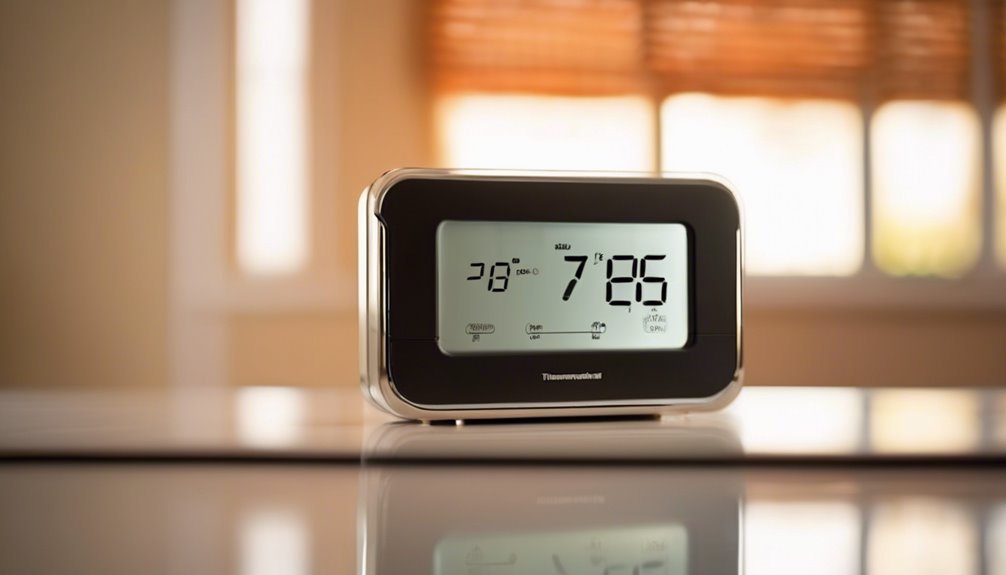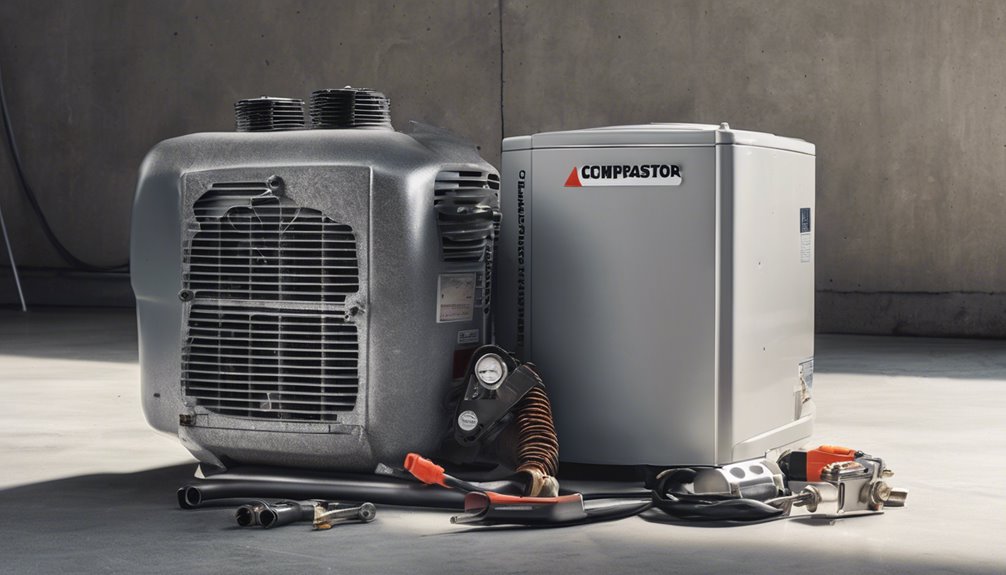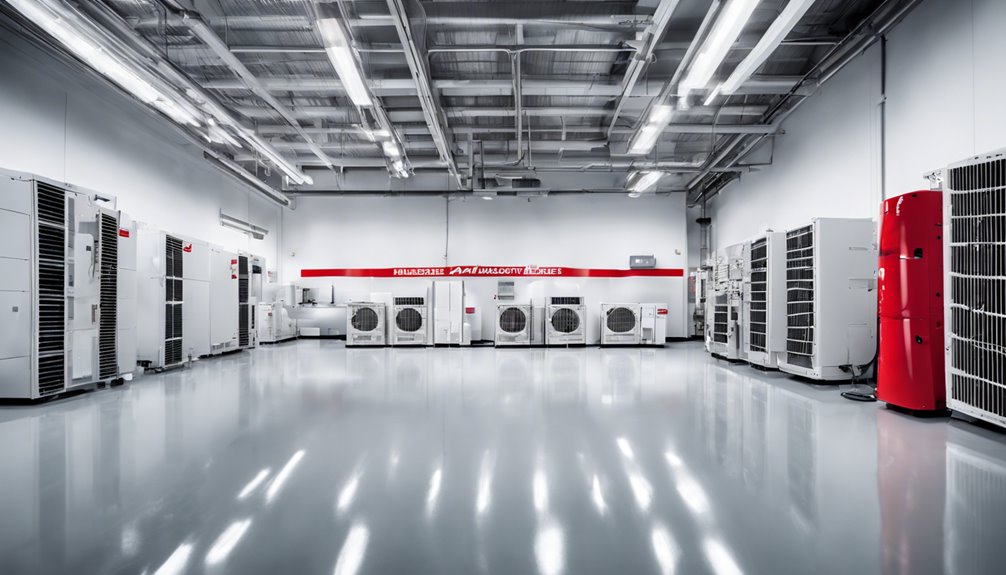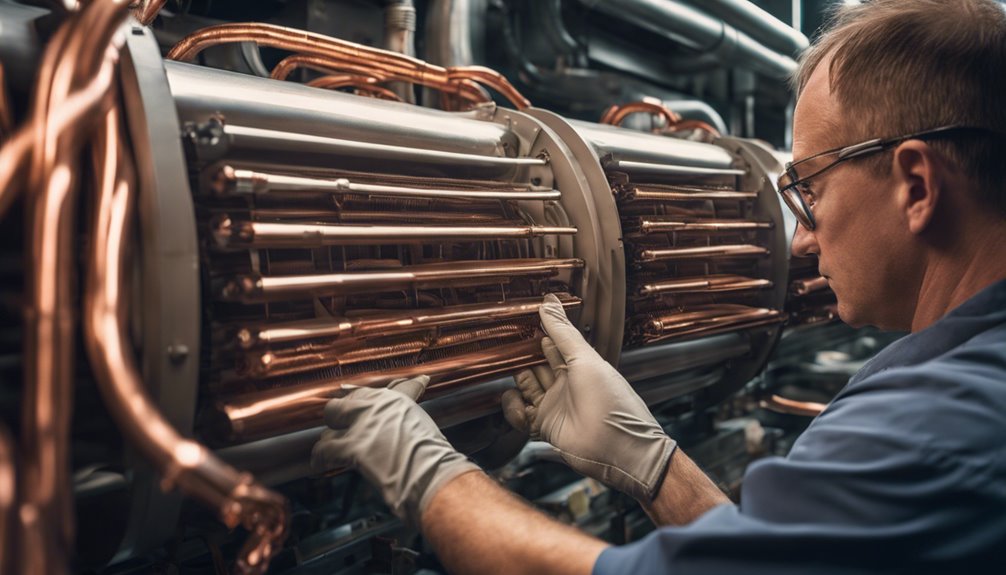Your AC is taking forever to cool your space, and you're wondering why. It's likely due to one of several common issues, including a poorly designed system, blocked air vents, dirty filters, refrigerant problems, or thermostat malfunctions. Maybe your unit is too small or too large for your space, or there are leaks in your ductwork. Whatever the reason, it's causing your AC to work harder and longer, hiking up your energy bills. Discover the root of the problem and learn how to get your AC running efficiently again.
Key Takeaways
- Undersized AC units or improper refrigerant charging can lead to longer cooling times and increased energy bills.
- Poorly designed ductwork, leaks, or blockages can restrict airflow, causing the AC to work harder and longer to cool.
- Dirty or clogged air filters can reduce airflow and compromise AC performance, leading to extended cooling times.
- Incorrect thermostat settings or malfunctioning thermostat sensors can prevent the AC from cooling efficiently.
- Neglecting regular maintenance, such as refrigerant checks and filter cleaning, can cause the AC to take longer to cool the space.
Inefficient System Design
Inefficient system design is a common culprit behind underperforming AC cooling systems.
You mightn't realize it, but your AC's design can significantly impact its performance. System limitations and design flaws can hinder your AC's ability to cool your space efficiently.
For instance, if your AC is undersized for your room, it'll struggle to cool the area, leading to longer cooling times. Similarly, poorly designed ductwork or incorrect refrigerant charging can also impede your AC's performance.
These design flaws can cause your AC to work harder, increasing energy bills and reducing its lifespan. By understanding these system limitations and design flaws, you can identify potential issues and take steps to optimize your AC's performance.
Poor Airflow and Ventilation
As you work to optimize your AC's performance, it's also important to consider the role of airflow and ventilation in the cooling process.
When air circulation is restricted, your AC has to work harder to cool your space, leading to longer cooling times. Ventilation issues can be a significant contributor to this problem.
Check for:
- Closed or blocked air vents, which can impede air circulation
- Poorly insulated ducts, allowing heat to seep in and cool air to escape
- Inadequate ventilation in your home, causing hot air to become trapped and recirculated
Dirty or Clogged Air Filters
You're probably aware that your AC's air filters need regular cleaning, but do you know why it's so crucial?
A dirty or clogged air filter can lead to a buildup of dust and debris, which in turn reduces airflow and compromises your AC's performance.
Filter Cleaning Essentials
Dirty or clogged air filters can significantly impair your AC's performance, leading to increased energy bills and reduced airflow.
As a homeowner, it's essential to prioritize filter maintenance to ensure your AC runs efficiently. Regular cleaning and replacement of air filters can make a huge difference in your AC's performance.
- Check your air filter every 1-2 months, depending on usage and environmental factors.
- Use a soft brush or vacuum cleaner to gently remove dirt and debris from the filter.
- Replace your air filter every 3-6 months or as recommended by the manufacturer to maintain optimal air purification.
Dust and Debris Buildup
Your air filter's cleanliness directly impacts your AC's performance, and neglecting it can lead to a buildup of dust and debris.
When your filter is dirty or clogged, it restricts air circulation, causing your AC to work harder and longer to cool your space. This can lead to ventilation issues, making your AC take longer to cool.
As a result, your energy bills may increase, and your AC's lifespan may decrease. To avoid these problems, make it a habit to check and clean your air filter regularly.
A clean filter ensures proper air circulation, allowing your AC to cool your space efficiently and effectively.
Reduced Airflow Consequences
When air filters become clogged or dirty, they severely restrict airflow, causing a ripple effect of problems throughout your AC system.
This reduced airflow leads to increased air pressure, which can cause ventilation issues and make your AC work harder to cool your space.
As a result, you'll notice:
- Longer cooling times, as your AC struggles to circulate air
- Increased energy bills, as your AC consumes more power to compensate for the restricted airflow
- A higher risk of breakdowns, as the added strain on your AC's components can lead to premature wear and tear
Leaking Refrigerant or Low Refrigerant Levels
Refrigerant is the lifeblood of your air conditioning system, and low levels or leaks can have a significant impact on its performance.
If your AC takes too long to cool, it could be due to refrigerant leaks or low levels. You might notice your energy bills increasing, or your AC running constantly without effectively cooling your space.
To diagnose the issue, you'll need to schedule refrigerant checks as part of regular system inspections. A professional technician will inspect your system, identify any leaks, and recharge your refrigerant to the recommended levels.
Don't delay, as refrigerant leaks can cause further damage to your system and the environment.
Thermostat Issues and Incorrect Settings
When you're struggling with AC cooling issues, it's easy to overlook the thermostat, but it's often the culprit.
You might be surprised to find that a simple incorrect temperature setting or a faulty thermostat sensor is the root of the problem.
Take a closer look at your thermostat's settings and components, including the battery, to identify potential issues.
Incorrect Temperature Setting
How often do you find yourself adjusting the thermostat, only to still feel uncomfortable in your home?
You're not alone. An incorrect temperature setting can be the culprit behind your AC's slow cooling.
- You're in Summer mode, but your thermostat is still set to a high temperature. Try lowering it to 68°F (20°C) or lower to give your AC a break.
- You're experiencing temperature fluctuation because you're constantly changing the thermostat setting. Try to keep it consistent to allow your AC to maintain a stable temperature.
- You haven't adjusted your thermostat setting according to the outside temperature. Remember to lower it when it's extremely hot outside to help your AC cool your home more efficiently.
Faulty Thermostat Sensor
Your thermostat's temperature setting might be correct, but if the sensor is faulty, your AC will still struggle to cool your home efficiently.
A faulty sensor can cause your thermostat to misread the room temperature, leading to incorrect cooling cycles. Check if your sensor is properly calibrated and placed.
Ensure it's not near any heat sources or drafts, as this can affect its accuracy. If you're unsure, consult your thermostat's manual for sensor placement guidelines.
Incorrect sensor placement can cause your AC to work harder, leading to longer cooling times. By checking and adjusting your sensor, you can ensure your thermostat is working correctly, and your AC can cool your home more efficiently.
Malfunctioning Thermostat Battery
A dead or dying thermostat battery can wreak havoc on your AC's performance, causing it to malfunction or not turn on at all.
If you're experiencing slow cooling, it's possible that your thermostat battery is the culprit. A malfunctioning thermostat battery can lead to battery drain, causing your thermostat to shut down or behave erratically.
Here are some signs you might need to replace your thermostat battery:
- Your thermostat isn't responding to temperature changes
- You're not receiving thermostat alerts or notifications
- Your AC is constantly running or not turning on at all
Replacing your thermostat battery is a simple fix that can get your AC running efficiently again. Make sure to check your thermostat's manual for the correct replacement procedure.
Oversized or Undersized AC Units
When choosing an air conditioning unit, it's crucial to select the right size for your space, as an oversized or undersized AC unit can lead to a host of problems.
If you've got a unit that's too small, it'll struggle to cool your space, leading to longer cooling times. On the other hand, an oversized unit will waste energy and increase your bills.
A capacity mismatch can also cause your AC to short cycle, reducing its lifespan. To avoid these issues, ensure you get a unit that's correctly sized for your space.
Consider factors like room size, insulation, and window orientation when selecting a unit. Proper unit sizing will help your AC cool your space efficiently and effectively.
Ductwork Leaks and Insulation Problems
Ductwork leaks and insulation problems can be a significant obstacle to efficient AC cooling.
If you're wondering why your AC takes so long to cool, it's time to inspect your ductwork. Leaks and gaps in your ducts can cause cooled air to escape, making your AC work harder and longer to cool your space.
- You may notice uneven cooling in different rooms or areas of your home.
- Your energy bills may be higher than usual due to the AC's increased workload.
- You might hear strange noises or feel air leaks when the AC is running.
Consider scheduling a ductwork inspection to identify and seal any leaks. Additionally, insulation upgrades can help keep cooled air from escaping, making your AC more efficient.
Lack of Regular Maintenance
Your AC's performance suffers greatly from neglect, and skipping regular maintenance is a surefire way to reduce its efficiency.
When you neglect maintenance, your AC has to work harder to cool your home, leading to longer cooling times. Dust and dirt accumulate on the coils, fan, and other components, causing them to malfunction.
Seasonal checks can help prevent this. By scheduling regular tune-ups, you can identify and fix issues before they become major problems.
Don't let maintenance neglect turn your AC into a sluggish performer. Stay on top of maintenance to keep your AC running smoothly and efficiently.
Frequently Asked Questions
Can I Use a Higher Thermostat Setting to Cool Faster?
You won't cool faster by setting your thermostat higher, but you'll achieve energy savings. However, be aware that temperature fluctuations can occur, making your space feel warmer than it actually is, so it's essential to find a balance.
How Often Should I Replace My Air Conditioning Unit?
You should replace your AC unit every 10-15 years, considering age factors. Sticking to regular maintenance schedules, like cleaning filters and coils, can help extend its lifespan, but eventual replacement is inevitable.
Does a Humid Climate Affect My Ac's Cooling Speed?
You live in a humid climate, which means humid air pockets and moisture buildup can slow down your AC's cooling speed. Your unit has to work harder to remove excess moisture, making it take longer to cool your space.
Will a Smart Thermostat Improve My Ac's Cooling Performance?
You're wondering if a smart thermostat will boost your AC's performance. It can! By optimizing energy efficiency and minimizing temperature fluctuations, a smart thermostat helps your AC work smarter, not harder, to cool your space more efficiently.
Can I Install a Bigger AC Unit to Cool Faster?
You're considering upgrading to a bigger AC unit to cool faster, but beware: improper AC sizing can lead to inefficient performance and higher energy bills. Unit upgrades require careful calculation to ensure the new system meets your home's specific cooling needs.
Conclusion
You've tried everything to get your AC to cool your space quickly, but it's still taking forever. The culprit might be hiding in plain sight. From inefficient system design to lack of regular maintenance, there are several reasons why your AC is slow to cool. Identify and address the issue, and you'll be enjoying a cooler space in no time. Remember, a well-maintained AC is an efficient one, so don't neglect those routine check-ups!



